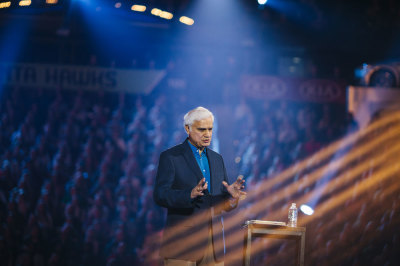Ravi Zacharias: I never wanted to be the best but do my best for God

Ravi Zacharias, one of the greatest Christian apologists of our time, died Tuesday at the age of 74, following a battle with a rare form of cancer.
During my stint as a journalist with Bangalore Mirror, I got to interview Zacharias in December 2012, when he came to Bangalore to deliver a talk on Christmas.
Ravi — who was compared to Christian apologetics titan C. S. Lewis and authored many Christian books, including the Gold Medallion Book Award winner Can Man Live Without God? — came across as a very humble person. He said, “To the best of my ability, I attempt to serve God. I have never wanted to be the best. I have wanted to do my best for God.”
He spoke his mind in an interview ranging from the prosperity doctrine to how he prepares to preach.
Excerpts:
As a leading Christian thinker, what do you think are the challenges facing the world today?
Cumulative wisdom is unable to meet the daunting challenges of our time. Biblical leadership is all I see here. We really don’t have any answers. So we swing from one extreme to another.
When I spoke at a breakfast meeting at the United Nations this year — my third time there — in private, many world leaders will tell you that they really don’t believe there are political answers to the world’s problems. The real challenge they face is how to go public with their own spiritual hunger. They must realize the moral imperatives of the Christian faith are important for societies to survive.
How would you respond to someone who asks you, “Why is Jesus Christ the only way? Why not Islam or any other religion?”
I would ask that person a very simple question: Is truth by definition exclusive or all inclusive? Truth by definition is an affirmation of a fact, the contrary position of which is denied.
It is a false question to think that only the Christian faith propositions exclusivity. All faiths proposition exclusivity. If you ask a Muslim scholar what is the final authority, he will tell you it’s the Koran. If you ask a Hindu scholar, he will tell you it is the Vedas. If you ask him what the ultimate non-negotiables are, he will say karma and reincarnation. Now, exclusivity is intransient to truth.
The question is, does the Christian faith stand up to the test of truth? That is what he should ask. And I find the message of Jesus — not just talking about the exclusivity of truth — brings relevance, hope and love. The last words of Jesus on the cross were, “Father, forgive them for they don’t know what they are doing.” Love and grace are at the core of what we need. This world needs a savior, and I believe in Jesus we find that savior.
If people react angrily to my answer, then I have to ask them, “What is your worldview that allows you to legitimately get so angry at an answer or to not in seriousness or sincerity pursue it? If you have an issue with my answer, let us discuss it.” Just to take a broad idea or logic and reject the whole thing is simply not in keeping with our fundamental laws of rationality.
What would you say to an atheist who says if God were a CEO of a company, he should be fired?
I would ask him, “Why?” And I know what he would say. He would probably give you a moral analysis of what is going on in the world. But the atheist does not have a right to a moral absolute he has already denied. So what is the moral absolute on which he bases his statement? He has to either justify moral reasoning or surrender moral reasoning. He cannot justify moral reasoning in a natural framework. Pragmatically, it may work.
But there is no rationally compelling reason why I should be moral. And if he denies the existence of God what moral framework is he using to judge God? Basically, he has his feet firmly planted in mid-air. So the problem has not been solved. God has to be in the paradigm for it to be resolved.
I would also ask the atheist a very simple question. Can you show me in your scientific world or naturalistic framework how a non-moral being with an amoral process brings about a moral framework? Can you tell me how consciousness can come from non-consciousness? Can you tell me how something can come from nothing? That quantum vacuum is not nothing. We know that they just try to tell you that within that framework there are all the primordial beginnings — the capacity for design.
The process of design is a legitimate debate. But the fact of a designer cannot be debated. You may as well tell me the dictionary came about from an explosion in a printing press. The astronomers say that the possibility of this universe happening by accident is infinitely greater than one of a jumbo jet developing because of a storm going through a junkyard. Think of the mathematical improbability of that happening.
So what do people like scientist Francis Crick say? They propose Panspermia theory which says that a spaceship brought some spores from another planet to seed the earth. And they accuse the Christian of having faith.
With that kind of a starting point, one of my professors of philosophy at postgraduate school used to say, “A naturalist is better at smelling rotten eggs than at laying good ones.”
What are your thoughts when people call you the C. S. Lewis of our times?
I feel bad for C. S. Lewis when anybody gets compared to him. How do you compare someone who lived two generations ago? Next year will be his 50th death anniversary. He was way ahead of his times. We are talking about his writings in the 50s and 60s — a brilliant combination of art, literature, philosophy and argument. He was unique. I think he was probably the greatest apologists in history. I am nowhere in the ranks of such a person. I live under no such illusion. People are very kind when they say things like that. If a speaker/writer takes any glorifying description of himself or herself seriously, it is the beginning of the end of their calling. I came through a life of successive failures. It’s only the grace of God that has opened doors and equipped me to do what I’m doing. I’m not in the ranks of giants like C. S. Lewis.
You keep coming to India often, where you have strong roots. You’ve seen India grow since the economic liberalization of the 90s. What do you think of India’s spiritual condition and its young generation?
I position the background to India in three ways. There are few nations in the world with such intellectual strength. The Indian mind is brilliant. Without dispute, India’s largest export is knowledge, intelligence and intellectual. India is fraught with several challenges and how it deals with them will determine success. One, the tendency to buy into corruption. This goes across the board. Almost any profession you go to, they try to buy their way into it. Two, factionalism and the fractured society. People don’t seem to be able to get along in organizations. Everybody has a fight, and goes and starts his own. Why are we not able to humbly work with one another? Three, unless we learn to realize that what we believe has to be measured against truth and not just against practice, we will run aground. We will run into problems. That’s the background. What I see in India? I love coming here. Hum dharti kay aadmi hai (I’m a person of the soil). I was born in Chennai, my father is from Kerala, and I was raised in New Delhi. I speak Hindi and Tamil. I love coming to India. I love Indian cuisine. I love its people, its movies. But we have a long way to go.
Well-known atheist Richard Dawkins says he doesn’t want to debate with creationists because the latter only do it for the sake of publicity. How would you respond to that?
He is the last person I would take seriously about criticizing someone for doing it for publicity. This man has become extremely wealthy by talking about God’s non-existence. I would like to get a look at his contracts at what kind of money he is getting paid and what kind of publicity he has got.
What is the place of Christian apologetics in Christian faith? Also, how should it be balanced with the message of Christ’s love?
Christian apologetics actually has two tasks. First, giving answers to specific questions. Second, making truth claims clear.
Truth must always be undergirded by love. My mother, who was from Chennai, and my father from Kerala, used to say, “If you cut off someone’s nose, there is no use in giving him a rose to smell.” If Christian apologetics cuts off the listener’s nose, there is no use in giving them the sweet aroma of the Christian message. You have to do it undergirded by love. You learn this as a parent. You can hammer something into your child’s head, and when they leave they extract it and fling it away. But if you sow it with seeds of love, it will remain in their hearts permanently. So the truth of Christ is both true and relevant undergirded by love.
What’s your take on the prosperity doctrine which has gained ground in Christianity?
Prosperity doctrine is not the private domain of Christians or Christian preachers. Many Hindu gurus have done very well with the prosperity doctrine as well. ‘Let your head be empty and your hand be full’ takes on a whole new meaning when you think of that kind of stuff. Look at the billions and the empires of some of the gurus and all the court cases being fought over money. You can also see that in corporations. You can see that in Wall Street. You can see that in families. Money and the attraction of money draws people from every walk of life. Look at politics and the corruption there. So you cannot denounce a calling or a vocation on the basis of those who abuse it.
And the prosperity doctrine — that tells you to follow and believe God because you can get wealthy — is a fundamental violation of what the Christian faith is all about. Jesus tells you, “What shall it profit a man if he gains the whole world and loses his own soul?” Your soul is what he talks to you about. But the media allows you to market faith in a way that dresses with shining light and highly polished appearances. And the means have become an end in itself.
Where do you see yourself in the future?
I want to make sure that I finish well. My biggest love and passion is my family. I want to see my children and grandchildren grow up and serve Christ. And if they will follow and walk closely with the Lord then I will consider my mission in life accomplished.
I see the Ravi Zacharias International Ministries and the Oxford Center of Christian Apologetics produce some of the brightest young intellects and apologetics in years to come. I want to make sure that RZIM and OCCA will do well and continue our legacy. I will keep writing and speaking, and like Billy Graham pray every day, “Let me not do anything that would ruin all these years of service to You and bring You a bad name.”
Here’s a preacher’s question. How does Ravi Zacharias prepare for a message?
There are ideals and then there are practical realities. When you are traveling around the globe sometimes fatigue is a very real factor, and you lose your sleep and you lose many hours of rest. The most important thing you have to prepare is, what do I want to see accomplished in the message? Pray, study, prepare with that in mind. When you do that — keeping in mind that ultimately the transformation of a heart is God’s prerogative, not ours — we do what God calls us to do.
You never prepare a message in a vacuum. You do it in years and years and years of study. What does a heart surgeon try to accomplish in heart surgery? To get that person back a new heart. Did it all happen in those few hours? No. It took years and years of preparation to get there. It is a life-long pursuit, not a momentary thing.
What would you tell Bible college graduates who want to preach like Ravi Zacharias?
I would tell them not to aim so low. I would ask them to be the kind of preachers God wants them to be. Not all of us can reach every person. My mother could have never stood on a pulpit. She was such a nervous type of person. But she was the kind of salt and light this world needs. She poured her life into us kids. If it weren’t for her, I wouldn’t have made it.
Be content with the giftedness God has given and don’t try to be someone else. If you try to be somebody else, you lose the uniqueness of what God hardwired you to be as an individual. Seek first what God has hard-wired you to be. Anyone who wants to try to be like someone else is running in the wrong direction.
The Bible says that judgment begins in the house of God. As one among the foremost Christian thinkers of our time, what would you say to the Christians and the Church?
Almost all of the failures we see globally are not the failure of the society but failure of the Church. Think of how divided the Christian Church is. They never seem to be able to come together even on the most serious matters. Each one wants his own little puddle. They say when the waters are low, every shrimp wants its own puddle. We’ve got our own little puddles in which we want to swim.
We have to know what it means to be a Christian in belief and in practice. The term follower of Jesus has become such a fluid term. People don’t even know what it means anymore. We have to think very carefully of what it means to be a follower of Jesus Christ. We are living in a world, which listens with its eyes and thinks with its feelings. We have to understand that. It has to be lived visibly and it has to appeal to the emotions of the audience we speak to. If the Church doesn’t respond in that character, we will only be another cultural movement across history.
What’s your advice to a Christian facing persecution, at a time when persecution is rampant in India?
Often persecution is done by those who claim to be the most spiritual but belonging to something else. It actually tells you that spirituality is just a mask for power.
I tell the ones who are persecuted this: When the early Church was persecuted it grew. When Christians were scattered all over the world they became the salt and light. Nobody wants or likes to be persecuted. But the Bible says we will be persecuted.
Not everybody wants the truth. Those who persecute Christians are really not looking for the truth. They are looking to propagate hate.
I say to the Christians, respond with love. Love is far more powerful and will ultimately conquer hate. Hate divides, love heals. Don’t respond with hate. The Church has grown. China and the Middle-East are classical examples of that. Don’t let the persecutors silence you. Live in a loving way. And live it out consistently.
Your Christmas message?
My message for Bangalore is: understand that God works in and through time, that God works across cultures, that God works across classes.
Francis Steven Dokka is a Christ-follower, muscian, and worship leader at Catalyst Church, Casa Grande, AZ. Besides leading worship at Catalyst, he serves as Christian Challenge’s campus missionary at the Central Arizona College, Signal Peak. He is married to LaSette, and they have two children.




























